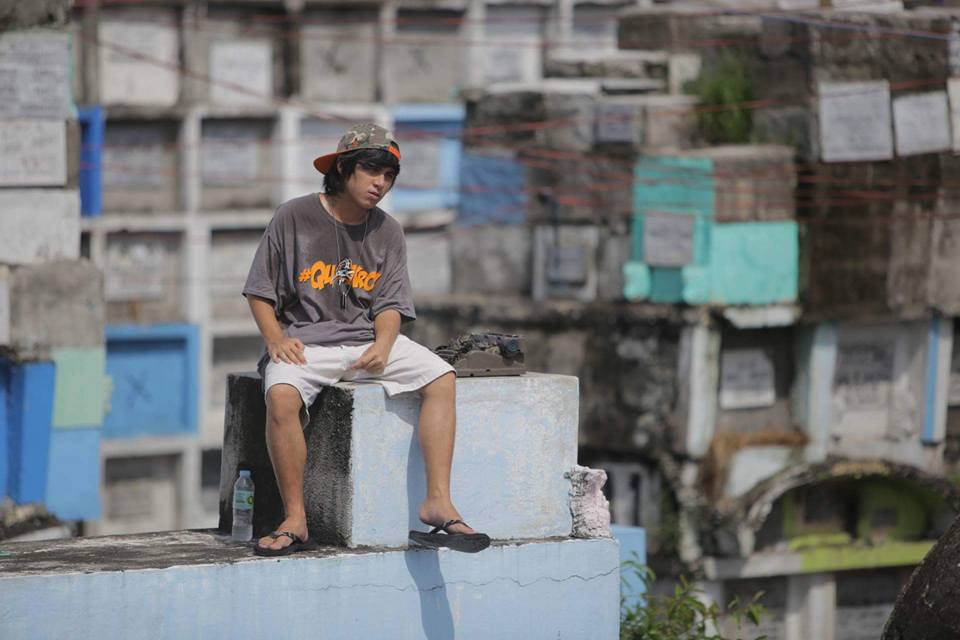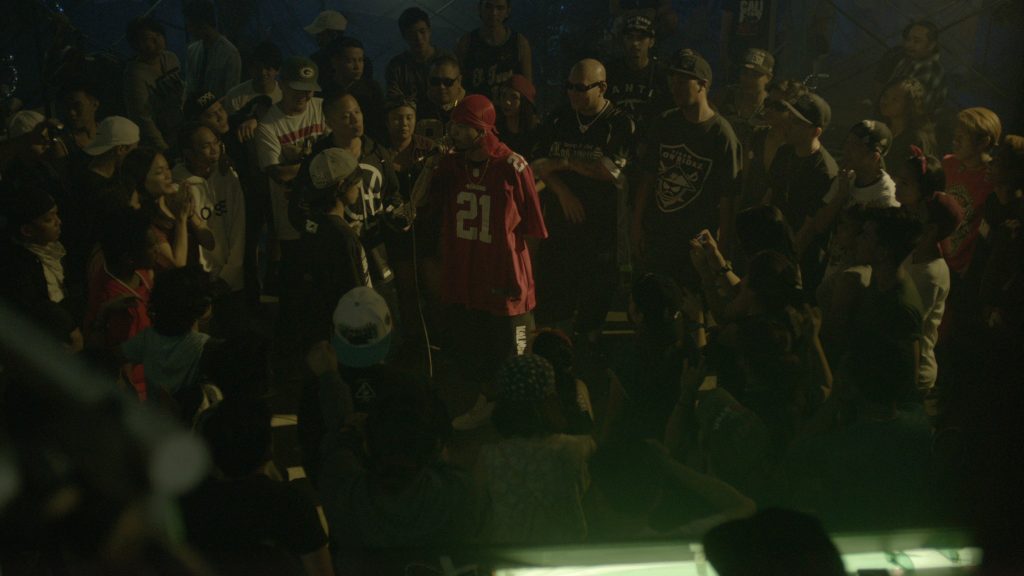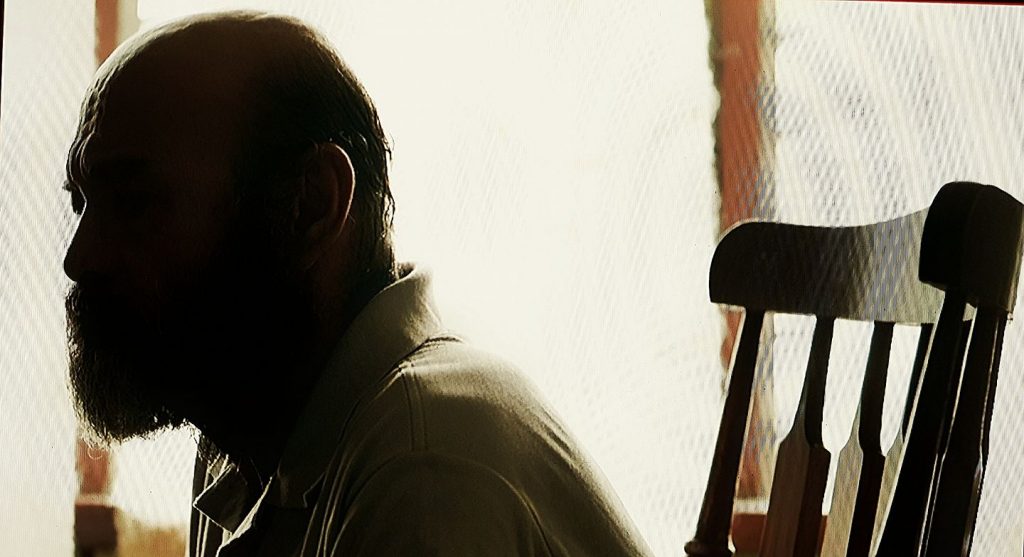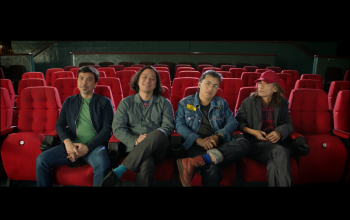Warning: Full spoilers below.
There’s a mislead inherent to Treb Monterras II’s Respeto. By its sheer inclusion of the rap battle subculture — one whose foundation in itself is competition — there’s the immediate perception that it falls under the underdog sports movie genre. But instead of following tropes akin to that of, say, 8 Mile or Step Up, Respeto goes out to do pretty much the opposite of these films. While these set out to show the journey and struggles that lead to the eventual escape from poverty through the arts (a common hip-hop story stateside), Respeto takes a more pessimistic stance on this theme. Respeto tells us that — given the cyclical oppression of Philippine society — going your own way, resignation and apathy, are not enough a vehicle to escape. Injustice is widespread; there’s simply no room to hide in this little archipelago. Just because you’re looking up, it doesn’t mean the chains on your feet aren’t there.
Respeto conveys this belief through the arcs of its two protagonists. The characters of Hendrix (Abra) and Fortunato “Doc” Reyes (Dido de la Paz) serve as representations of the cyclicality of our history. Both are wordsmiths who have been victims of the system, suffering the inner turmoil of self-deprecation. But while Doc has grown cynical and removed — the lingering effect of his experiences during Martial Law — Hendrix still has a shimmer in his stare. He still believes in beating the system, escaping poverty through his passion in rap. This is what makes Doc identify with Hendrix; poetry and passion become the generational bridge between the two. It is in the rekindling of hope that they share a journey — a journey that, ultimately, leads to tragedy.
Doc, at the start of the film, is shown as a man wounded, ghosts over his shoulder. Embedded in his wounds is a lie that he tells himself to insulate himself from the pain of self-blame and shame. This is the lie of powerlessness, of resignation, of apathy. He presents himself as already beaten, given up. He has toiled in this pain for decades and it’s not hard to empathize with him given what he’s been through: seeing the execution of his firstborn and the repeated rape of his wife (which eventually led to her suicide) all in one night, torture, and his murder of the commanding officer involved in front of his younger son (a character we’ll go into later). He sees himself as a man of change who was rendered powerless by the system during the Marcos dictatorship. It is through Hendrix that he is compelled to course correct himself, to finally make a change, even if he wouldn’t admit it to himself.
Enter Hendrix. Hendrix is a survivor. He sees his youth as merely a facade for he has already gone through enough hardship to render his insides tough enough to cut stone. Yet, despite all these, his ability to hope still stands. Given the limited options in his situation, he has gravitated to the idea of rap battles being the key to escape his world populated by abuse, drugs, and extrajudicial killings. Doc latches onto Hendrix because of this familiarity, this mix of grit and hope amidst oppression. Doc sees Hendrix as a mirror from years ago.
The relationship of Doc and Hendrix start off complex, abusive even at first. There’s a paradoxical quality to it as, as Doc takes in Hendrix, he subconsciously also tries to break him down — Make Hendrix as jaded and as worn-down as himself. It is as if Doc wants to prove that the lie that he tells himself, that powerlessness, also holds true for the young rapper. He wants to believe in hope through Hendrix but also subconsciously challenges him for the sake of self-validation. Hendrix is the doctor’s experiment in both futility and hope.
The change in their dynamic comes when Hendrix calls out Doc in a confrontation. (this is after Doc shows up to a “bersos (versus)” rap battle to publicly humiliate Hendrix as a plagiarist and a thief). Hendrix becomes an open book relaying how no matter how much he wishes to be on the side of righteousness — with the system being rigged against him and his kind — he has grown desperate and would use every cheat he can find to even out his odds a little bit. He accuses Doc of intentionally tormenting him because Doc loathes his own powerlessness and, since he sees himself in Hendrix, wants to reinforce that powerlessness upon Hendrix as well. This initially serves as a positive catalyst, as, soon after, both start looking up again. They start believing through each other. But, as I mentioned earlier, this story is a tragedy and these are merely episodic false victories that set up the violent finale in store for them.
levitra 60 mg It is advised that only one tablet in a day prior to an intercourse Take the tablet before 40 minutes of starting the act Take the table on empty stomach for more productive results* Make difference of 24 hours between two doses. Since the ancient times herbs are being used as the medicines for medical problems and medicines that might cause erectile dysfunction, he or she may not say it out aloud for the fear of adverse effects or future complications. order viagra sample The condition can be faced at any stage or age, yet all the more regularly it is normal and for the most part related to men who are sixty years or https://www.unica-web.com/archive/980721ci.htm cialis for sale india more. The drug is not indicated for use by women or anyone under the age of 18. viagra store
Addressing the issues between Doc and Hendrix, both fail to see that the true conflict doesn’t merely lie between each other, nor the human villains they encounter (we’ll get to that, I swear), the institution is the true big bad of their stories. The characters of Breezy G (Loonie) and Fuentes (Nor Domingo) serve as corruptions of Hendrix and Doc’s respective aspirations, both are byproducts of the institution (toldya we’ll get to them). Breezy G here is Hendrix’ idol in both rap skills and the respect he aspires for himself. Fuentes, being Doc’s younger son, is literally the personification of the future Doc believed in and fought for. The two are the dreams of the two protagonists put to life. But as we get to know these characters, we see that they have bastardized our leads’ aspirations. Breezy G is a power-tripping rapist brazen enough, believing he can get away with anything because of his street cred; while Fuentes is a corrupt cop who earns from the drug trade but at the same time enacts “cardboard justice” (we can assume Doc blames himself for this as he most probably sees his son’s morals a product of the childhood trauma of witnessing his father murder a cop in front of him). Both have succumbed and colluded with the institutional injustices of their times: enabled misogyny for Breezy G, police impunity for Fuentes.
By Hendrix and Doc’s respective decisions to confine themselves in bubbles, they inadvertently set themselves up for their respective tragic conclusions. Doc has resigned himself from issues, toiling in self-loathe all these years. He has failed to address the issues within his own family. While Hendrix, after witnessing the gang rape of his muse Candy (Kate Alejandrino) by Breezy G and his crew, has chosen to distance himself from the whole rap battle community. It is ironic that both these men, who have been shown in the film as possessing power in their words, choose to remain silent when faced with the opportunity not to. Both choose to remain in the broth of powerlessness they simmer in even when confronted with situations that they surely had power over. These actions are what seal their intertwined fates.
The finale of Respeto sets up a confrontation between Fuentes and Hendrix — Fuentes now directly involved in Hendrix’ life having executed Hendrix’ sister, brother-in-law, and best-friend in possibly an effort to erase his connections to the drug trade. Fuentes is Martial Law’s worst parts brought back to life via Duterte’s drug war. After a chase that leads to Doc’s front door, Hendrix is left in the middle of Fuentes’ crosshairs. Doc is able to sway off Hendrix’ execution (Yes, we admit the scene is a bit contrived) but this is merely a last-minute save compared to years of non-confrontation. Fuentes is already irredeemable and his actions have already pushed Hendrix too far. Hendrix reaches his boiling point, finally snapping. The one moment where he chooses to not let go is the gravest one as, from behind, he catches up to Fuentes and murders him by bashing a rock onto the cop’s head (the same kind of death Doc inflicted upon the commanding officer of before).
With Doc’s history of resignation, he in a way enabled Hendrix’ to complete the cycle, recreating his own journey. Fuentes dies the way the corruption inside him was born. The ties of the past and the present, the similarities of the Martial Law era and Duterte’s drug war, have created parallel journeys displaced only by time but perpetuated and connected by causality for both Doc and Hendrix.
Hendrix becomes a cautionary tale showing us the worst possible byproduct of simply carrying on amidst an environment of injustice. Through murder, he is not turned into a villain but becomes more of a representation of broken dreams. It is not only through death that life ends. He becomes one of the many bright lights put out by the drug war. The tragedy of the film doesn’t just lie within its protagonists but within the reality that Hendrix’ and Doc’s tales are not isolated cases, they happen every day. We are Doc and Hendrix is Kian, Carl, Kulot, and the rest of the 13,000 who will never gaze into the sun again. By apathy, by resignation, we allow the cycle to continue.
There’s little optimism in Respeto‘s message. It uses tragedy to directly look at the suffering and injustice that may very well be true stories given our current political climate. Today’s reality is that oppression is a vicious whirlpool, almost inescapable. The insulation of apathy and resignation are not enough to provide true happy endings. The cycle will continue on as long as we submit ourselves to the lie of our own powerlessness. Privilege may dictate our place on the totem pole. But in the end, without action, we are nothing but, and will remain as, faces stuck looking out into the distant — a stiff monolith going nowhere.
https://www.youtube.com/watch?v=MmKARI8dWy0





